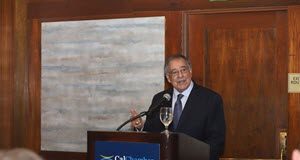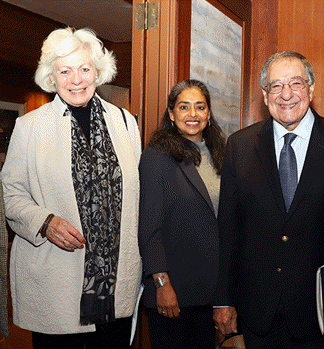
The quality of U.S. leadership will determine whether the world will see an American renaissance in coming years or an America in decline, former Defense Secretary Leon Panetta told an international breakfast audience hosted by the CalChamber Board last week.
Among the nearly 60 attendees at the December 13 gathering were representatives from the Consulates General of Canada, Ireland, Italy, India, Japan, Singapore and Ukraine.
For too long, Panetta said, rather than showing leadership, government leaders instead have “governed by crisis.” One example, he said, is the lack of fiscal discipline shown by both parties in dealing with the nation’s record $36 trillion debt.
That style of governing means the parties have a hard time doing what is needed because they wait for crisis, Panetta said, and “when the crisis gets so bad, you just blame [the] crisis, and you kick the can down the road.”
The price of that approach, he warned, is losing the trust of the American people. “That’s why we have a lot of anger and frustration with our system of government.”
Panetta, now chairman of the Panetta Institute for Public Policy in Monterey, recalled experiences dealing with budgetary concerns as a former member of Congress, CIA director and defense secretary.
The system of checks and balances built by America’s forefathers means leaders have to come together, have patience, be willing to listen and be willing to work together, he said.
Noting that he has seen Washington at its best and its worst, Panetta said he “saw Washington work” when he got elected to Congress. Although there were political differences, “We worked together on big issues and we were able to deal with challenges” to support a strong economy, strong defense and develop a strong democracy.”
Global ‘Flash Points’
The United States faces a “pivotal moment” abroad as well, with more “flash points” in the world today than since World War II, Panetta said. For example:
• The “axis of autocrats” working together in “unlimited partnership” to go after democracy. Russian President Vladimir Putin invaded Ukraine, a sovereign democracy in Europe, the way Adolf Hitler moved into Poland and across Europe, Panetta said.
• Terrorist groups like Hamas and Hezbollah attacking Israel “because they do not believe it has the right to exist.”
• China threatening democracy in Taiwan.
• North Korea threatening democracy in South Korea.
• Iran spreading instability in the Middle East and beyond.
Add cyberthreats, artificial intelligence (AI) and nuclear proliferation to these examples and the dangerous world in which we live is evident, Panetta said.
Signs of Hope
Signs of hope do exist for the United States being able to continue providing the leadership that no other country can, Panetta said. In these endeavors, he said, the nation must pursue “peace through strength.”
Positive signs in Europe, he said, include:
• The NATO alliance is stronger today than in the past and unified in support of Ukraine.
• Russia has been weakened by its invasion of Ukraine, with 600,000–700,000 casualties. Having to bring in 10,000 North Koreans to fight is a sign of weakness. Working with U.S. allies to give Ukraine the support it needs will provide leverage to enable the nation to negotiate with Russia for a peaceful resolution to the conflict.
Similarly, the United States must deal with China from strength, not weakness, Panetta asserted. He highlighted the importance of the United States having strong allies in Asia: Australia, India, South Korea and Japan.
To achieve the international goals of the United States raises the challenge of mobilizing the American people, Panetta said.
Nation’s Strength
The real strength of this country, he asserted, is not in Washington, but in the spirit, resilience, courage and hard work of “our people in community after community across this country.”
He said he has seen that strength in the eyes of the men and women in uniform he had to deploy into harm’s way in Iraq and Afghanistan, willing to “fight and die in order to protect our country.”
The United States needs “a little bit of that strength in our elected leadership, so they are willing to put their lives on the line in order to do the right thing for America,” he said. The country, he said, needs that courage, that will to fight and “achieve the American dream that our parents sought, to make an America in renaissance and to truly have a government of, by and for all people.”
Staff Contact: Susanne T. Stirling



